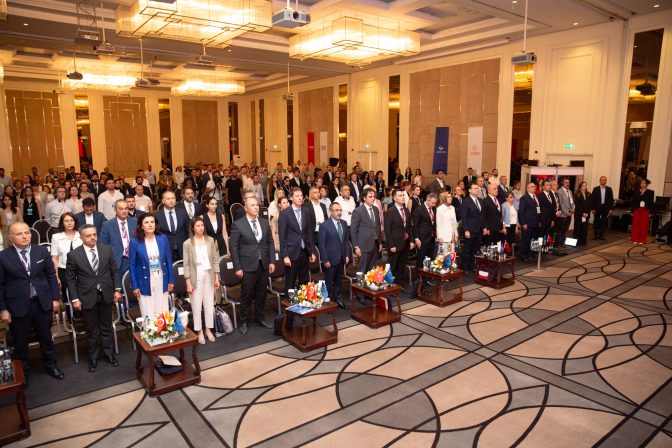International Urban Mobility Conference and Project Closing Event
Organized as part of the SUMP Türkiye Project, the International Urban Mobility Conference and Project Closing Event took place on 7–8 July 2025 at the Bilkent Hotel and Conference Center in Ankara. The event provided a platform to discuss the future of sustainable mobility policies, share lessons learned from SUMP implementation in Türkiye, and strengthen multi-stakeholder dialogue.
With more than 300 participants, the event brought together representatives from public institutions, municipalities, academia, civil society organizations, the private sector, and national and international experts.

Highlights from the Event
Opening Speeches
Keynote speeches were delivered by Suat Yıldız, Secretary General of the Union of Municipalities of Türkiye; Jurgis Vilcinskas, Deputy Head of the EU Delegation to Türkiye; and Kutluhan Taşkın, Deputy President of the Presidential Strategy and Budget Office. Speakers emphasized the strategic significance of sustainable mobility and the multifaceted impact of the SUMP Türkiye Project.
Day 1 – Panels
Planning: The Key to Impact and Progress
This session focused on the strategic role of planning in sustainable urban mobility and discussed how long-term visions can be integrated with political ownership and institutional capacity.
Presentation of the SUMP Türkiye Project
Dr. Wolfgang Backhaus, Project Director, presented the overarching strategy and planning approach of the project, and shared methodologies developed throughout the process. The presentation was followed by the screening of the SUMP Türkiye Almanac Film, summarizing the project’s key milestones and results.
Fostering Change: Case Studies from Türkiye and Europe
The panel featured comparative analyses of successful local practices from both Türkiye and Europe, exploring how tailored solutions address urban mobility challenges.
Integrated Approaches in National and Local Planning
Panelists shared institutional experiences on aligning national policy frameworks with local implementation practices, highlighting coordination mechanisms and multi-level governance.
Day 2 – Panels
Data-Driven Mobility Governance
Discussions focused on the role of data in decision-making processes, addressing the collection, management, and integration of mobility data into policy-making. Topics included digitalization, open data, data security, and inter-agency data sharing.
Building Resilient Urban Mobility Systems
Panelists examined strategies for ensuring the resilience of urban transport systems in the face of climate change and disaster risks, with a focus on emergency preparedness and protecting vulnerable groups.
Bus Rapid Transit (BRT) Systems
Experts evaluated the applicability and efficiency of bus-based public transport systems, discussing planning, financing, infrastructure, and service quality, with examples from Türkiye and Europe.
Promoting Equity in Daily Mobility
This session addressed inclusive mobility for women, children, older adults, and persons with disabilities. Speakers discussed accessibility, safety, and the integration of gender-sensitive approaches into mobility policy.
Closing Session and Impact
The conference concluded with a reflection by Project Director Dr. Wolfgang Backhaus. A closing reception was held, featuring remarks from Fikret Gültekin, Director of Project and Finance at the Union of Municipalities of Türkiye, and a plaque presentation to the project team.
This conference marked a critical milestone in aligning Türkiye’s sustainable urban mobility policies with the European Green Deal and EU transport strategies. Held at the conclusion of the project’s 36-month implementation period, the international gathering laid the groundwork for Türkiye’s long-term mobility vision spanning the next 25 years. It enhanced the visibility of successful local practices, reinforced cooperation opportunities at national and international levels, and contributed to the institutionalization of multi-stakeholder mobility governance.



